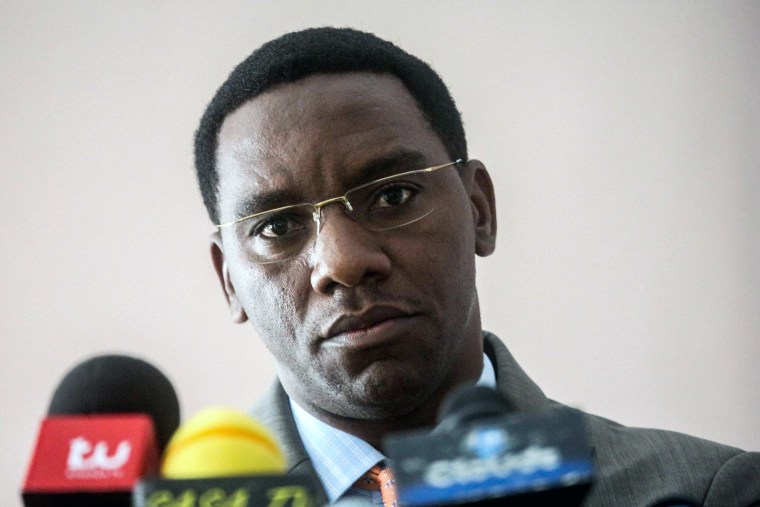Indonesia Proposes Bill To Separate, Rehabilitate LGBT by Closet Gov. Officials
I added "By closet Government Officials" because It is known that people afraid to be gay are the real enemies of this community. Who else will volunteer or make themselves available for such an endeavor than closeted gays?
 |
| (Banned from Tanzania for his work against LGBT)Paul Makonda, Regional Commissioner of Dar es Salaam, during a press conference in Dar es Salaam, Tanzania on Aug. 9, 2017.baKhalfan Said Hassan / AFP - |
Lawmakers in Indonesia are pushing legislation that would force LGBTQ people into government-sanctioned rehabilitation centers to “cure” them of their sexual orientation or gender identity.
Last month, three lawmakers in Indonesia's House of Representatives introduced a draft of what is known as the “Family Resilience Bill.” The legislation would force gay, lesbian, bisexual and transgender people to undergo rehabilitation at a series of religiously-based treatment centers that would hypothetically be opened across the conservative archipelago. If they do not readily submit to rehabilitation, their family members would be compelled to report them.
The draft bill also claims that LGBTQ people are a “threat” to the nuclear family and likens homosexuality to incest and sadomasochism.
Sadik Mujahid, a supporter of the legislation and a member of the Gerindra Party, reiterated those assertions in comments to the Indonesian media outlet Jakarta Post. She also claimed that the question of whether someone is LGBTQ is not a “private matter” in Indonesia, unlike in “Western countries.”
“The practice of homosexuality," she said, "does it not disrupt the future of mankind on a family basis?” LGBTQ advocacy groups say that if passed, the legislation would have a grave impact on sexual and gender minorities in Indonesia. In a statement opposing the bill, the human rights group OutRight Action International notes that it would create a department within the Indonesian government specifically to handle “family crises due to sexual deviation.”
Although OutRight stops short of labeling the proposed rehabilitation centers as “conversion therapy” clinics, it says the government’s methods are likely to include “spiritual guidance and social, psychological and medical rehabilitation.”
Jessica Stern, the organization's executive director, adds the legislation would only intensify “the mounting persecution and hate” faced by LGBTQ people in Indonesia, and make the community even more “vulnerable and isolated.”
Dede Oetomo, the co-founder of the Indonesian LGBTQ group Gaya Nusantara Foundation, believes the legislation is merely another attempt on the part of lawmakers to target LGBTQ people after the failed attempt to criminalize homosexuality two years ago. A 2018 parliamentary bill attempted to ban all sex outside of marriage, and because same-sex marriage is prohibited in the majority-Muslim country, that proposal would have included all same-sex sexual activity.
According to Oetomo, the government's goal is to “create a moral panic” in Indonesia, which historically tolerated gay people until the government began pushing anti-LGBTQ bills a few years ago. Unlike neighboring Malaysia, Indonesia’s criminal codes — a relic of the colonial era — do not mention homosexuality, although conservative provinces like Aceh have their own punishments under local Shariah laws.
“I have actually come across young mothers who are afraid their children will be transgender, gay or lesbian,” Oetomo said. “They think if you sit with a trans kid in school, you'll be trans — that it’s contagious.”
Without an anti-sodomy law in place, advocates believe the Family Resilience Bill is about finding a legal pretext to justify anti-LGBTQ discrimination. Savitri Nurina, the media relations manager for Amnesty International Indonesia, said police and vigilante groups have targeted the community with a series of raids in recent years. In October 2017, an estimated 51 people were arrested in a sting operation on a sauna in Jakarta popular with gay men, while a mob organized by the Islamic Defenders Front raided the headquarters of an HIV prevention group last year.
“It feels like we are moving backward,” Savitri said. “They're trying to make human rights violations official, and we cannot allow that.”
There is debate over whether the Family Resilience Bill, which is waiting to be formally introduced in the Indonesian Parliament, stands a shot at passage in 2020. The draft legislation has been met with widespread condemnation by civil society groups over provisions requiring women to remain in the household in order to “fulfill the rights of the husband and children according to religious norms.”
Mutiara Ika Pratiwi, a representative of the Indonesian feminist group Perempuan Mahardhika, condemned the proposal as an attempt “to control families.”
“Maternity rights should be provided for the fulfillment of basic women’s rights,” Mutiara told the Jakarta Post.
Even if the Family Resilience Bill meets the same fate as the adultery legislation, advocates said damage has already been done. According to Oetomo, the local LGBTQ community is “downright afraid” that one of these proposals will eventually be signed into law, and some individuals he knows have already begun researching the process of “seeking asylum or moving somewhere else.”
In addition, Oetomo claimed local authorities are already looking at instituting their own LGBTQ rehabilitation programs. Last year, Mahyeldi Ansharullah, mayor of Padang, the capital of West Sumatra, personally supervised a series of forced exorcisms on a group of 10 women who were arrested and charged with homosexuality.
“Preventing the bill is one thing, but the situation is already very bad,” Oetomo said, noting that two dozen such proposals are reportedly being weighed across Indonesia.
But for now, advocates are doing everything they can to make Indonesia a safe place for LGBTQ people to live. Opponents of the Family Resilience Bill delivered a petition last week condemning the bill, and Oetomo’s organization is part of a national campaign to build bridges between conservative religious groups and the LGBTQ community, in order to create greater mutual understanding.
“It’s possible to fight back,” he said. “Except for the rabidly homophobic provinces like Aceh, West Sumatra, and West Java, life actually goes on as usual.”

Comments